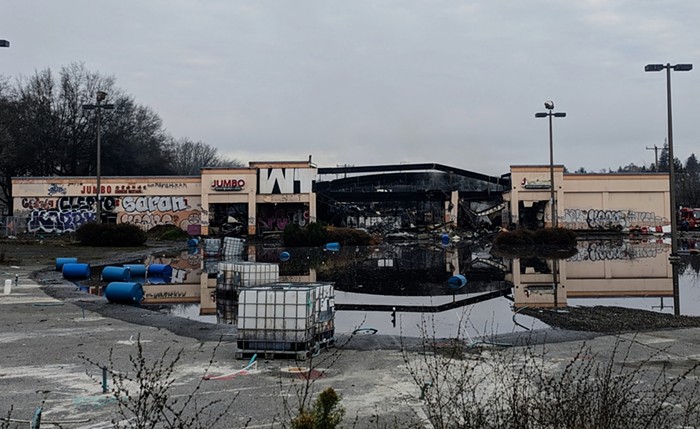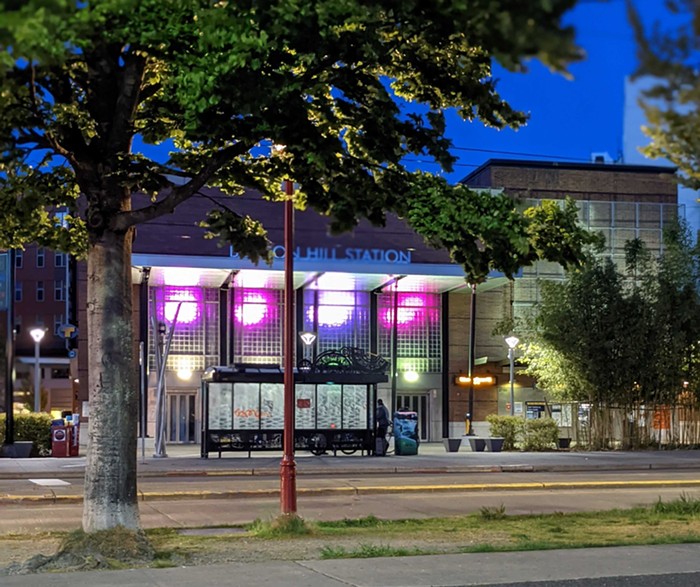
To grasp the current conjuncture (the city council's repeal of the "Amazon Tax") of Seattle's unending and worsening homeless crises, we only need to examine the 2017 Seattle Bike Blog post "I want to endorse Nikkita Oliver, but she says she may pause downtown bike lanes and the Missing Link." It's by Tom Fucoloro, who is very much on the left, and is even challenging one of the foundations of American capitalism, car ideology, by advocating for increased funding of Seattle's bike infrastructure. In the post, Fucoloro expresses his desire to endorse the most radical candidate of the 2017 mayoral election, Oliver. But he is not at all impressed with her picture of Seattle's priorities: she places the homelessness crisis above completion of the bike network.
Oliver to SBB:
“I have to stress that our city is currently in a state of emergency around homelessness.. I believe it is the duty of our city leaders to prioritize addressing these exigent human service needs first. This may require us to put some projects, like construction of bike lanes on hold in order to ensure that we have the financial resources to address the state of emergency around homelessness in our city.”And there you have it. Oliver stated something that many on the conventional left find hard, if not impossible, to stomach. Most would be fine using tax dollars to pay for safer bike lanes. Even Amazon might approve of this kind of public expenditure, which by no means a bad thing. But taxes going directly to the homeless? This is seen by many as throwing a lot of good money into a form of poverty that has, in their eyes, resisted all attempts to end. It is a black hole.
Yes, there are many who are just upset about the Amazon Tax as a tax, and there are some who mostly see it in the terms of an ideological battle that has been with us ever since the poor started getting ideas. On one side are the values of those at the bottom (give me!); and on the other side, those at the top (do not take from me!). And those at top want their values (no taxes/taking) supported by the government and the public—even if the latter benefits greatly from the taxes. But I suspect that if the Amazon Tax wasn't directed at the homeless, and instead, went to something like dedicated bike lanes, or, as my friend Angela Garbes said to me during drinks at the Clock-Out Lounge, to increasing the number of plastic poop bags at parks and along sidewalks, the Amazon Tax's chances would have been much better. That kind of spending is seen as going into something, rather than nothing, which is how we in Seattle see the homeless. These great no-things.
It's not amazing or profound to point out that the feeling Ryan expressed in this tweet is typical...
Do you seriously think that taxing businesses for hiring a lot of people is the right way to fund homelessness programs? I mean, seriously.
— Ryan (@ryanhealy) June 11, 2018
The fact that is standard stuff exposes the extent to which the city has aligned its core values with the values of the rich—who naturally hate the poor as much as they hate taxes. We really see the homeless, not as we see them, but as the rich do. As useless. As a big waste of time and effort. A problem that only knows how to grow and grow. As a black hole.
Recall this striking scene from Charles Burnett's film, To Sleep With Anger:
HARRY
Well, you and your husband are special. Ya, Gideon tells me you do volunteer work to help feed the
poor.Pat beams with joy because Harry recognizes the important work she is doing.
HARRY
How many people do you all feed?PAT
Last Saturday we handed out over 200 meals.HARRY
Good God Almighty, bless your bones. (pause) But the problem grows.PAT
Week by week the crowds at the door keeps getting larger. We can't feed all the hungry.HARRY
Of course not. Have you ever heard of a man jumping in the river to save 500 drowning people? No you ain't. (pause) You have to take just one and fatten him up. When you spread help too thin, you, you just nickel and dime the situation. If you try to save all, all die but if you save one life, life goes on. You just
have to remember, medicine that works leaves a bitter taste.
That was filmed in 1990. But both Harry (the bad guy of the film) and Pat (a faithful Christian) articulate a popular sentiment that's still with us today: the homeless crisis grows on its own. It's like an invasive species, a demon-possessed blackberry bush. It has an inner will. It thrives, it breeds, it spreads from a force within. Money is just too weak to stop or repress it. Dollars that get sucked into the hole of the homeless will only disintegrate.
The hatred of the wretched, of course, has an important social function. It makes them wretched all the more, and this indeed makes more and more tangible their wretchedness, which is, in itself, abstract, or, to use Werner Bonefeld's translation of sinnlich übersinnlich: sensuous-supersensible. There is really no reason why anyone should be in this condition of wretchedness. We live in society that suffers not from scarcity or want, but chronic overproduction. The housing crisis of 2008, to give just one of many examples, was not about a lack of houses; it was about too many house not making enough money to cover interest payments.
Wretchedness in our inverted world is imposed on humans by humans. But we do not blame the otherwise obvious production of wretchedness on a system of cultural values that, through ideological platforms, is matched with the values of those at the top. We actually do not see the enforcement—just the wretchedness, which, though culturally produced, has real effects (sensuous-supersensible): the RV is all beat-up, the RV owner dumps shit here and there, homeless people stink, their clothes are dirty, they sleep on the street, and so on. However, these conditions are as unreal (as abstract) as the home values that seem to rise so wonderfully. If you hate the homeless, you are chained to (and speaking for) your master.


















